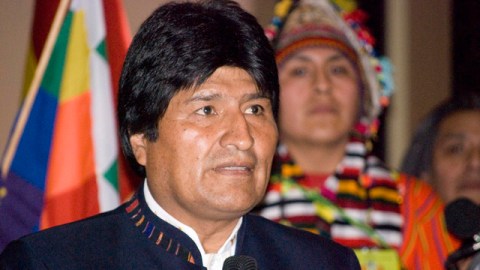Bolivian President Evo Morales, General Wesley Clark, Filmmaker Guillermo del Toro Interviewed by Big Think

Big Think interviewed an array of luminaries in a variety of fields this week, including several world leaders and giants in the arts.
Bolivian President Evo Morales, in New York for United Nations week, sat down with us for half an hour to talk about the Obama administration’s drug policies, his friendship with Cuba’s Fidel Castro, and why the entire world will soon reject capitalism and embrace communitarian socialism. He also compared the element lithium to a a beautiful woman (“much sought after and pursued, especially in Bolivia”), and talked about why it’s not a contradiction that he espouses environmentalism while his country’s economy increasingly depends on extraction of gas and minerals.
Former Supreme Allied Commander of NATO and Presidential Nominee General Wesley Clark stopped by the offices to talk about some of the ways in which the United States’ long struggle in Iraq could be considered a victory, the importance of Pakistan’s fate to the War in Afghanistan, and China’s ambitions to build to a navy that will rival that of the United States. Conflict around the world is just one of many reasons the United States needs to cut its dependence on foreign oil by implementing a portfolio of renewable energy solutions. As a Co-chair of Growth Energy, General Clark is a staunch supporter of ethanol, but he isn’t naive about the fact the a cleaner, less fossil-fuel-dependent-America may also rest on our ability to adopt new forms of electric cars, many of which will be released this Fall.
Literary giantess Margaret Atwood made an appearance at the Big Think offices, toting a turnip disguised as a cabbage and a wide brim hat made of recycled cardboard, newspaper, and paper bags. During the interview we discussed why writers and audiences are fascinated by apocalyptic and dystopic fiction, like her most recent book The Year of the Flood. Atwood, who comes from a family of scientists, also discussed with us the neurology of reading, which may have evolved from the need for hunters to track their prey by interpreting their tracks. She also talked to us about how she managed to amass 85,000 twitter followers and how twitter and e-books are reshaping how we produce and consume media.
Novelist Jonathan Lethem stopped by for an interview in the midst of a move to California, where he will take up a teaching position formerly held by David Foster Wallace at Pomona College. Lethem, an avid fan and sometimes writer of detective fiction, gave us a primer on film noir. He also talked about how technology has created an alternate virtual reality that is inextricable from our “real,” non-virtual life, something he explored in his most recent novel “Chronic City.”
Mexican filmmaker Guillermo Del Toro also came into the Big Think offices and told us about the monsters that reside in his head. Del Toro has spent his life fascinated by monsters and fairy tales, both of which have featured prominently in his films and his latest vampire fiction trilogy The Strain. He told us that he is fascinated by the “Mormon-ization” of vampires in recent films and TV shows like Twilight. He also discussed his involvement in video game development, which he thinks will be intertwined with the future of film. And he told us that, while he is not frightened by monsters, he is terrified of the LAPD.
Former president of Ireland Mary Robinson graced the Big Think offices this week during a break from the Clinton Global Initiative happening just uptown. One of the most powerful female leaders in the world, Robinson talked to us about different styles of leadership among women and about why many female leaders are viewed as cold and calculating. Now the president of the human rights group Realizing Rights, Robinson also explained why climate change is as much a human rights issue as an environmental one.
Jeffrey Pfeffer, professor or Organizational Behavior at Stanford University, stopped by Big Think Studios Monday to discuss power, which also happens to be the name of his new book. In the interview he spoke about why some people have it – and others don’t. From advocating interruption and anger to why work quality and intelligence are less important, Pfeffer outlined what it takes to gain power – from why Millennials aren’t ready for the harsh realities of work to why MBAs should take acting classes.
Dr. Stuart Firestein joined Big Think on Wednesday to provide an expert’s view on good and bad taste—not the kind involving a stylish outfit or debonair behavior, but rather your brain’s ability to distinguish salty, sweet, sour, bitter, and umami, a savory taste that’s long been accepted in Eastern cultures, but has only recently been added to the West’s gustatory dialect. Our discussion with Firestein also lead us up the human nose, for an in-depth description of the neuroscience of smell, which as anyone who’s ever caught a cold can attest, accounts for up to 80% of our ability to taste anything at all.
And believe it or not, there are 27 million slaves in the world today. During his visit to the Big Think offices this week, Kevin Bales, an expert on modern slavery, disabused us of the notion that slavery ended in the 19th century. President of the organization Free the Slaves, Bales told us how individuals can join the fight against this horrific practice, including how to spot evidence of slavery here in the United States, where there are an estimated 50,000 slaves.
If you want to be notified when our video interview with these luminaries are posted, please subscribe to the What’s New at Big Think RSS feed.





